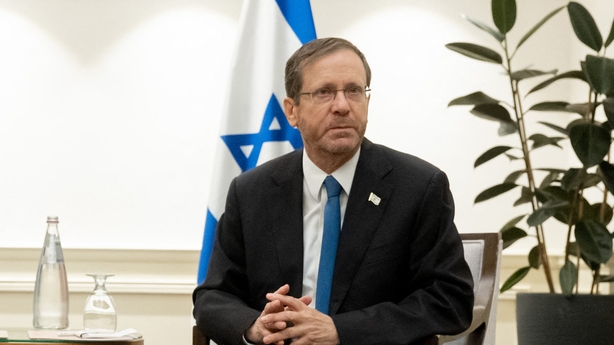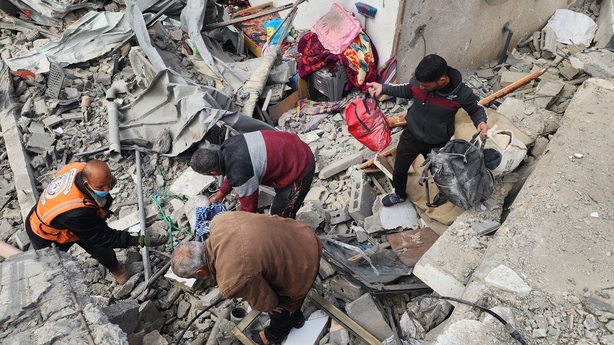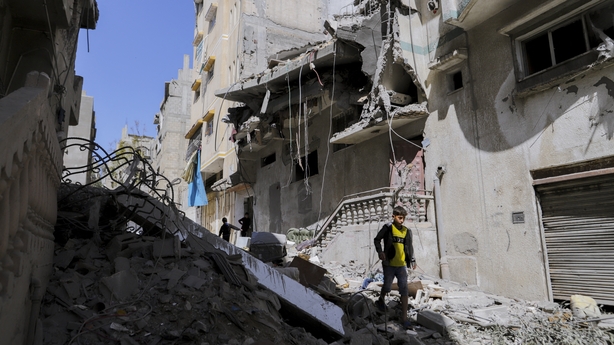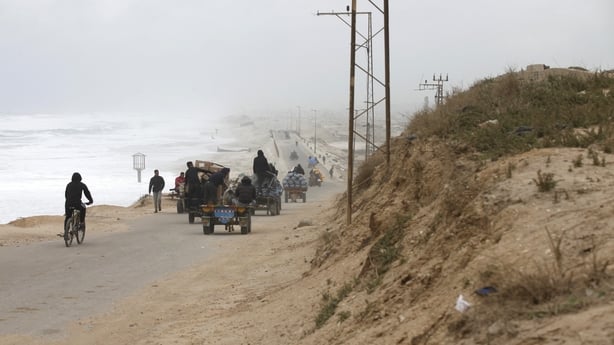The Israeli military has said it has begun a ground operation in Shaboura, Rafah in southern Gaza, over the past few hours.
It added that it had also expanded its activity in southern Gaza and continued its activity in northern and central Gaza.
"Over the past few hours, IDF (army) troops began conducting ground activity in the area of Shabura in Rafah. As part of the activity, the troops dismantled... terrorist infrastructure," the army said in a statement, adding that "simultaneously, IDF troops are continuing ground activity in northern and central Gaza".
It comes after Gaza's health ministry said that at least 91 Palestinians were killed and dozens wounded in airstrikes across the enclave after Israel resumed bombing and ground operations.
Israel's President Isaac Herzog has expressed concern over steps being taken by the government, hours before the cabinet was due to fire the domestic security chief in an unprecedented move.
"It is impossible not to be deeply troubled by the harsh reality unfolding before our eyes," Mr Herzog said in a video statement, stopping short of mentioning Prime Minister Benjamin Netanyahu by name.
"It is unthinkable to resume fighting while still pursuing the sacred mission of bringing our hostages home," said Mr Herzog, whose role is largely ceremonial.

His unusual statement also comes ahead of a state budget vote expected later this month, in which the government proposes raising taxes and cutting education and health funding while ramping up spending in the ultra-Orthodox Jewish sector - a plan that has drawn criticism as many ultra-Orthodox do not serve in the army.
"Thousands of reserve duty call-ups have recently been issued, and it is inconceivable to send our sons to the front while simultaneously advancing divisive and controversial initiatives that create deep rifts within our nation," Mr Herzog said.
Calling on decision-makers to "carefully weigh every step and assess whether it strengthens national resilience", the president criticised the decision to resume fighting in Gaza while Israeli hostages, including some who are known to be alive, remain in Gaza.
After two months of relative calm, Palestinians in Gaza were again fleeing for their lives after Israel effectively abandoned a ceasefire, launching a new all-out air and ground campaign against Gaza's dominant Palestinian militant group Hamas.
Leaflet drops
Israeli aircraft dropped leaflets on residential neighbourhoods, ordering people out of Beit Lahiya and Beit Hanoun towns in the north, the Shejaia district in Gaza city and towns on the eastern outskirts of Khan Younis in the south.
"War is back, displacement and death are back, will we survive this round?" said Samed Sami, 29, who fled Shejaia to put up a tent for his family in a camp on open ground.
A day after sending tanks into central Gaza, the Israeli military said it had also begun conducting ground operations in the north of the densely populated enclave, along the coastal route in Beit Lahiya.
Hamas, which had not retaliated during the first 48 hours of the renewed Israeli assault, said its fighters fired rockets into Israel.
The Israeli military said sirens sounded in the centre of the country after projectiles were launched from Gaza.
Palestinian medics said Israeli strikes targeted several houses in northern and southern sections of Gaza.
With talks having failed to bridge differences over terms to extend the ceasefire, the military resumed its air assaults on Gaza with a massive bombing campaign on Tuesday before sending soldiers in the day after.

Over 500 Palestinians killed by Israeli strikes since Tuesday
Earlier, the Israeli military said that its forces had been engaged for the past 24 hours in what it described as an operation to expand a buffer zone separating the northern and southern halves of Gaza, known as the Netzarim corridor.
Israel ordered residents to stay away from the Salahuddin road, Gaza's main north-south route, and said they should travel along the coast instead.
Tuesday's first day of resumed airstrikes killed more than 400 Palestinians, one of the deadliest days of the 17-month-old conflict, with scant let-up since.
Read more:
'No one is safe in Gaza', says UN Special Rapporteur
Taoiseach strongly condemns Israeli strikes on Gaza
In a blow to Hamas as it sought to rebuild its administration in Gaza, this week's strikes have killed some of its top figures, including the de facto Hamas-appointed head of the Gaza government, the chief of security services, his aide, and the deputy head of the Hamas-run justice ministry.
The Islamist group said the Israeli ground operation and the incursion into the Netzarim corridor were a "new and dangerous violation" of the ceasefire agreement.
In a statement, it reaffirmed its commitment to the deal and called on mediators to "assume their responsibilities".

For Israel, a return to full-blown war could prove complicated, some current and former Israeli officials say, amid waning public support and burnout among military reservists.
Protesters accuse Mr Netanyahu of continuing the war for political reasons and endangering the lives of remaining hostages.
A temporary first phase of the ceasefire ended at the start of this month.
Hamas wants to move to an agreed second phase, under which Israel would be required to negotiate an end to the war and withdrawal of its troops from Gaza, and Israeli hostages still held there would be exchanged for Palestinian prisoners.
Israel has offered only a temporary extension of the truce, cut off all supplies to Gaza and said it was restarting its military campaign to force Hamas to free remaining hostages.
Israeli troops reported opening fire on Palestinians in cars
The ceasefire had allowed Huda Junaid, her husband and family to return to the site of their destroyed home to camp out in the ruins.
But they were now forced to flee again, packing their few remaining belongings into a donkey cart and searching for a new place to pitch their tent near a school.
"We don't want war, we don't want death. Enough, we are fed up. There are no longer children in Gaza, all of our children are dead, all of our relatives are dead," she said.

Some Palestinians who tried to use the Salahuddin road said they saw cars come under fire from Israeli troops advancing towards Netzarim.
The fate of those in the vehicles was unknown.
"Bulldozers protected by some tanks were heading to the west coming from the areas where they are stationed near the fence east of the Salahuddin road," one taxi driver said, asking not to be identified for fear of reprisals.
A Hamas official said mediators had stepped up efforts with the two warring sides but no breakthrough had yet come.
Some residents said there were no signs yet of preparations by Hamas on the ground to resume fighting.
But an official from one militant group allied to Hamas, who asked not to be identified, said that fighters, including from Hamas, had been put on alert awaiting further instructions.
Fighters had also been told to stop using mobile phones.
The war erupted after Hamas militants attacked Israeli communities near the Gaza border in October 2023, killing 1,200 people and taking more than 250 hostages, by Israeli tallies.
More than 49,000 Palestinians have been killed in the ensuing conflict, according to Gaza's health authorities, with much of the enclave reduced to rubble.
